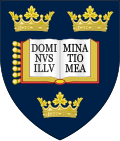Background

The Boat Race, first held in 1829, is a side-by-side rowing competition between the University of Oxford (sometimes referred to as the "Dark Blues") [1] and the University of Cambridge (sometimes referred to as the "Light Blues"). [1] Oxford went into the race as reigning champions, having defeated Cambridge by 4+1⁄2 lengths in the previous race held in 1842. However, Cambridge led overall with four wins to Oxford's two. [2]
The universities failed to agree on a location or a date for a race in 1843 or 1844, so no contests were held those years. [3] In November 1844, the Cambridge University Boat Club secretary wrote to Oxford in an attempt to restart the Easter running of the Boat Race. [4] The Oxford committee "seemed willing" and in the Lent term proposed a change to the course, to race above Putney Bridge rather than below it on 15 March. [5] It was the first Boat Race to be conducted between Putney and Mortlake on The Championship Course, previous races having taken place between Westminster Bridge and Putney Bridge, or on the Thames at Henley between Hambleden Lock and Henley Bridge. [6] [7] Cambridge arrived in London on the Wednesday before the race, Oxford following two days later. Following their displays in practice rows, Cambridge were considered favourites for the race. [8]
Cambridge "rowed in an outrigger built by Searle, 60 feet (18 m) in length, 2 feet 8 inches (0.81 m) in breadth", while Oxford's boat was "expressly built for this match by King of Oxford" and 58 feet 6 inches (17.83 m) long. However, the river conditions on the day were so rough that the Cambridge crew abandoned using their new boat and instead used their training boat, which was built by Logan and belonged to Second Trinity Boat Club. [9]
The umpire for the race was W. H. Harrison, Commodore of the Royal Thames Yacht Club, [10] while the starter was Edward Searle. [8]

